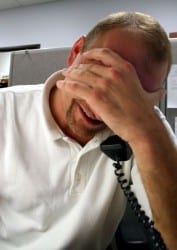6 Categories of Lame Plagiarism Excuses
 Whether you are dealing with plagiarists online, in an academic environment or in the workplace, odds are that you’re going to hear a lot of lame excuses for the misdeed.
Whether you are dealing with plagiarists online, in an academic environment or in the workplace, odds are that you’re going to hear a lot of lame excuses for the misdeed.
Over the years, I’ve heard hundreds of excuses and I often joke about writing a book of “Things Plagiarists Say” made up of quips from my email box from people caught taking the works of others without attribution.
However, rather than doing that, I’ve decided to revisit the overarching themes of plagiarism excuses and the patterns that I see. After all, when you are accusing someone of plagiarism, you are basically accusing them of lying and, as with any other fib, people will do almost anything to avoid being called out on it.
So, the next time you have to confront a plagiarist here are just some of the more common excuses you can expect.
1. I’m Too Good to be a Plagiarist
This one is surprisingly common. When you accuse some people of plagiarism, often they will try to divert the topic to other elements of their person that put them in a better light.
Whether it’s highlighting other accomplishments, standing in the community, religious affiliation or simply their power and position, the idea is basically “Plagiarists are bad people and I’m not a bad person, therefore, I’m not a plagiarist.”
This excuse completely ignores that even the most noble people make mistakes, including plagiarism. However, the difference is that the truly great will face their mistakes and correct them rather than making excuses for them or ducking blame.
2. It’s Just Coincidence
This one is a tough one. Many cases of suspected plagiarism reasonably could be mere coincidence. However, many plagiarists will stretch this argument well past the breaking point.
For example, when you have hundreds of words copied verbatim, given the many thousands of common words in the English language, the odds of being the exact same to another work quickly reaches astronomical numbers.
Think of it this way, picking just five numbers (from 1-100) correctly can win you millions of dollars, getting dozens or hundreds is more or less impossible.
Granted the odds aren’t truly random, as with lottery numbers, (this is due to common phrases and the structure of our language) it’s still random enough to eliminate coincidence in most plagiarism cases.
3. I Didn’t Say It Was Mine
Imagine the frustration of an instructor, talking to a student about plagiarism, only to have the student claim that he “Never said it was his work.”
Many fail to grasp, or don’t want to grasp, that authorship is implied in anything you put your name to unless you expressly say otherwise.
There are variations of this excuse that question what authorship actually means. Some have adopted this idea that authorship is a nebulous thing and that, since there’s nothing new under the sun, nothing can say they didn’t write a work that they merely copied.
But while philosophers will debate the nature of authorship for generations to come, academia, literature and the law all have pretty solid definitions of what authorship is and most students and creators are aware of those rules, try as they might to ignore them.
4. I Made a Mistake
The mistake excuse, as with the coincidence one, is often a gray area. While forgetting to attribute a single quote is an understandable error, copying large portions of a paper without any attempt to attribute any of it is more than a mistake or sloppy note-taking.
For ethical academics, journalists and creatives, attribution always follows any copying. Even if a mistake is made in attribution, usually there is some clear attempt to provide it, such as mentioning a name or including quote marks. After all, attribution is a multi-step process of identifying what is copied, separating it from the original material and attributing the source. Failure to do all of that is not a single, simple mistake but a series of them that would be almost impossible to do without some malice or, at the very least, extreme negligence.
So, while mistakes happen, it’s usually pretty easy to separate an honest mistake from a true case of plagiarism.
5. I Have a Photographic Memory
Eidetic memory, more commonly known as photographic memory, is often claimed by plagiarists who can’t explain how the words of others work wound up in their creations.
However, scientists currently believe that eidetic memory is either a myth or exists only in a small handful of people. Most people who claim to have a photographic memory merely have a good one as even The World Memory Championships have failed to find a confirmed case of eidetic memory.
But even if a plagiarist had eidetic memory, they would also remember where the work came from and, most importantly, the rules for attribution and using the content. In short, they wouldn’t remember all of the work they copied and forget how to use it correctly.
That being said, there are situations where peoplke genuinely believe that they said something that, in reality, they heard elsewhere. However, generally, that’s over very short phrases and sentences, such as with a joke, and doesn’t extend to exact word choice.
6. It Wasn’t Me, It Was Someone Else
Of all of the plagiarism excuses, in most cases, this one is probably the dumbest. Not only is it almost always a lie, but, by admitting that you got the work from someone else, you’re admitting that you’re a plagiarist. The only caveat is that you got permission from someone else to do it.
This would be like saying “I didn’t rob the bank, I was just the getaway driver.”
To be fair, there are situations where it is considered acceptable to pass off the works of others as you own, as with ghostwriting and Web development, but that doesn’t mean you aren’t responsible for everything you put your name to.
If you didn’t create the content yourself and you’re putting your name to it, you need to be sure that it is original and doesn’t violate any laws (not just copyright). Failure to do so is simply reckless.
Bottom Line
When you accuse someone of plagiarism, if you’ve got your evidence lined up and the situation looks clear, you should definitely brace yourself for some excuses, most of them very pathetic.
All in all, the best thing you can do is ignore them. Though it’s tempting to mock or attack excuses, the problem is that excuses often turn to anger, threats and worse when challenged.
Simply ignore them, handle the situation the same as you would have otherwise, and then move on (possibly laughing at the excuse in private later). If you’re pressed on whether or not you believe them, say that what you believe doesn’t matter, that you have to do what you have to do.
It reduces the stress in dealing with these situations and, in the end, doesn’t give the plagiarist a reason to feel angry or victorious.
Instead, it just lets everyone put the incident behind them as quickly as possible.
Special Thanks: I want to thank Cath Murphy at Lireactor for a great post about the lame excuses plagiarists make that was, in large part, the inspiration for this article.
Want to Reuse or Republish this Content?
If you want to feature this article in your site, classroom or elsewhere, just let us know! We usually grant permission within 24 hours.
